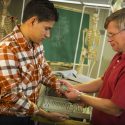Student entrepreneurs working to green the economy
While some students use college as a transition into the “real world,” an increasing number of student entrepreneurs have asked themselves, “Why wait?”

In February of last year, University of Wisconsin–Madison senior Ted Durkee and University of Wisconsin–Madison alumnus Brandon Gador founded Powered Green, a startup company promoting the use of renewable energy. They officially launched the company at the end of September.
Powered Green is an initiative whose aim is to reduce the environmental impact of laptops, which in their lifetime can use as much energy as a typical U.S. home does in one month.
Durkee, a mechanical engineering major, and Gador, who has a degree in marketing from the business school, offer a recycled aluminum energy seal for $16 for customers to stick on their laptops as evidence of their support of the initiative. Of the total amount, $14 subsidizes the production of enough renewable energy to offset the lifetime energy use of the average laptop. The remaining $2 pay for the seal itself and the packaging.
Since Durkee and Gador pay for more than one million kilowatt hours of renewable energy at a time, they receive bulk discounts. A small profit from those discounts is helping offset administrative costs of the project.
In addition to supporting the production of renewable energy, Durkee and Gador endeavor to provide consumers with a chance to publicly showcase their advocacy of the green movement.
“There are a lot of people, especially our age, that really can’t show the fact that they’re green besides using a reusable grocery bag,” Gador says, pointing out hybrid cars and other such initiatives are out of the price ranges of most students. “We saw a huge opportunity with people already putting stickers on their laptops. We thought that all the green individuals could identify with us right away and rally behind an opportunity.”
Despite the relatively recent launch, Powered Green is generating national recognition. More than 350 people have joined the partnership to date and have stopped more than 400,000 pounds of carbon from reaching the atmosphere. An MTV video blog features the young entrepreneurs talking about the initiative.
Durkee and Gador are also involved with a number of businesses, including Village Green Energy in San Francisco and Ancora Coffee in Madison. Village Green Energy is one of Powered Green’s renewable energy suppliers, and they also sell seals to their other customers. Ancora Coffee offers Powered Green’s seals in 5 of their locations in the Madison area.
“There’s a lot of energy that is used in the daily operation of a retail coffee shop, and we felt that it would be great to try to build awareness of how we could better serve the public by offering them this seal that they can attach to their PC that’s so often used in a coffee shop environment,” says Sue Krug, co-owner and vice president of Ancora Coffee, who also notes that she was impressed with the student duo’s ambition. “These two guys seemed to have a very basic understanding of business and what it requires of you as an entrepreneur, and building upon an idea that might be new and novel.”
While it’s important to Durkee and Gador to gain awareness for their initiative on a national level, they’re also dedicated to involving the campus with their endeavors. They sit on the board of the Green Coalition and are collaborating with Big Red Go Green to design a plan to provide renewable energy for all campus kiosks and information labs.
In fact, Durkee and Gador credit their student status for part of their success.
“If we hadn’t been students and had these contacts through the school, we wouldn’t be where we are,” Gador says, pointing out that networking at the university connected them with Web site designers and mentors throughout the process.
Philip Kim, an assistant professor in the Wisconsin School of Business, served as a mentor for Gador.
“(Gador) has the grit that’s necessary for entrepreneurs to overcome a lot of the obstacles they face when starting new businesses,” Kim says. “He is a very personable individual and networks very successfully with other professionals in his field.”
Durkee points to Sarah Pfatteicher, assistant dean in the College of Agricultural and Life Sciences, as one of his major influences in starting Powered Green.
“Ted has taken advantage of the remarkable opportunities here to prepare himself to address the issue (of the energy crisis) in a new and creative way,” Pfatteicher says. “He views renewable energy as a social issue as much as a technological one, and Powered Green addresses both of those components. It allows a lot of folks to support green energy in an immediate and affordable way.”
The future of Powered Green, according to Durkee and Gador, depends on the future of renewable energy.
“We’re going to be dedicated to this until we start to see major changes in the renewable energy industry,” Durkee says.
Adds Gador: “We could go get jobs and live comfortably, but in the end we wouldn’t necessarily be excited with what we chose. We feel that focusing on this and starting this initiative is really where we can take the tools we got from this university and apply them in the best way we know how.”
Tags: business, entrepreneurship, learning, student life



